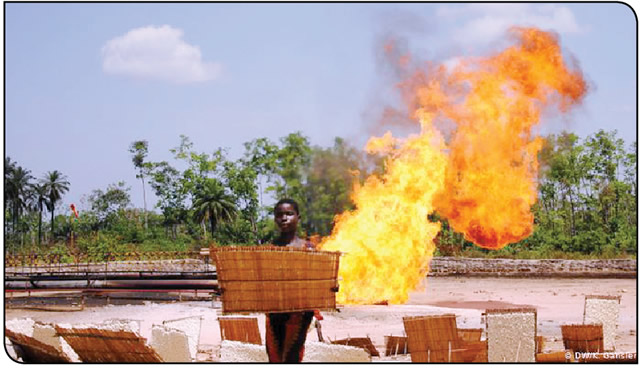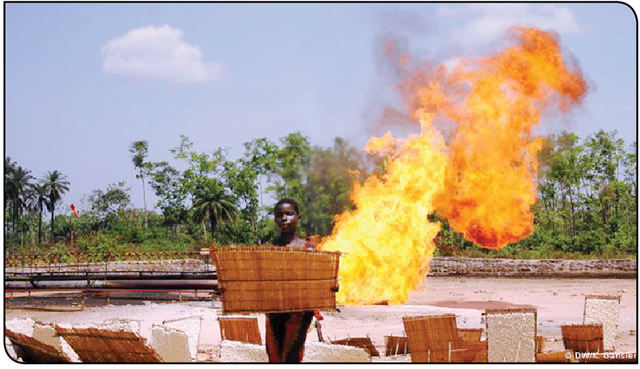The latest report that Nigeria lost $16 trillion to gas flaring in the 10 years to 2022 highlights the prevailing national culture of waste, and the institutional failures that hamper the country’s development. In its 72nd edition of the ‘Statistical Review of World Energy 2023,’ the Energy Institute detailed how Africa’s largest economy lost the trillions due to natural gas flaring by oil producing companies between 2012 and 2022 despite a national programme decreeing an end to the practice. President Bola Tinubu should decisively stop the ludicrous enterprise on his watch.
Gas flaring, the process of burning off natural gas during oil extraction and processing, has long been associated with wasted energy, environmental and health concerns, and huge economic losses.Yet, successive Nigerian governments and regulatory agencies have recklessly allowed it for decades bowing constantly to the defiance of the oil companies.
With over 200 trillion cubic feet, Nigeria has the largest gas and non-associated gas reserves in Africa and the world’s ninth largest. But heedlessly, a large part of this valuable resource is flared.
Yet, the country is broke, with a foreign debt of $43.16 billion by the second quarter of 2023, says the National Bureau of Statistics, and spending over 90 percent of all public revenue servicing its debt. It has an infrastructure gap that the African Development Bank says will require $3 trillion to close within30 years. Unemployment remains high at 33.3 percent, and it hosts the second largest number of poor people in the world after India.
A country with its poor human development indices should be maximising its natural endowments, not burning them, and damaging its environment and the health of its people in the process.
Incidentally, modern technology enables effective gas-trapping during crude oil extraction and provides immense opportunities that other countries are deploying to boost their economies.
Tinubu, who has retained the oil ministry portfolio, must therefore fully enforce the Nigerian Oil and Gas Industry Content Development Act that stipulates penalties for gas flaring and mandates oil companies to stop flaring gas.
The EI’s report showed that upstream and downstream oil and gas firms operating in Nigeria brazenly flared the highest amount of gas in 2012, estimated at 12.9 billion cubic metres, 9.2bcm in 2013, 8.3bcm in 2014, and 7.5bcm in 2015, but dropped to 7.2bcm in 2016.

A gas flaring spot in the Niger Delta region.
Flaring rose again to 7.5bcm in 2017, before plummeting to 7.3bcm in 2018, and then rose to 7.8bcm in 2019. According to experts, the value for each 1.0bcm cubic of natural gas is worth about $183million, totalling an estimated $16trillion lost within the period.
According to the World Bank, gas flaring cost the global economy $20 billion in 2018. Nigeria contributed $761.6 million or 3.8 percent of that, said PwC, a leading consultancy. Nigeria and just nine other countries account for 75 per cent of global gas flaring. These are Russia, Iraq, Iran, United States, Venezuela, Algeria, Mexico, Libya, and China, the 2022 Global Gas Flaring Tracker Report confirmed.
Data from the National Oil Spill Detection and Response Agency indicated that oil companies in Nigeria flared gas worth over $1billion from January 2022 to August 2023, resulting in a financial loss of N843billion.
Experts say the gas wasted in Nigeria in 2022 could potentially generate 14,700 gigawatt hours of electricity. Instead, the flaring resulted in carbon dioxide emissions equivalent to 7,800 metric tonnes. The economy suffers, the environment is damaged and residents in and near oil-producing sites are exposed to health hazards.
The government should adopt responsible fiscal and resource management practices. It similarly tolerates industrial-scale theft of its crude and refined petroleum products. With daily crude theft currently at 400,000 barrels per day, an industry watchdog,NEITI, estimated that between 2009 and 2020, Nigeria lost 619.7million barrels of crude valued at $46.16billion or N16.25trillion.
Furthermore, the environmental cost of gas flaring amounts to N28.8billion annually, says the National Environmental, Economic and Development Study for Climate Change in Nigeria.
Though the government had announced various measures to eliminate gas flaring, including the recent emergence of 42 indigenous oil and gas companies to manage 49 flare sites in the 2022 Nigerian Gas Flare Commercialisation Programme, clearly, the march towards zero-gas flaring is still slow and uninspiring and the prospect of achieving real progress is inhibited by bureaucracy.
Tinubu should reactivate the Nigeria Gas Master Plan that failed to meet the target of ending gas flaring by 2008. A new target date of 2030 must be realised.
Although Statista listed Nigeria as the 10th largest exporter of natural gas in 2022 with 19.6bcm exported, experts say it could easily overtake Indonesia at No.9 (21.8bcm), and Turkmenistan in eighth place (40.7bcm), if it moves fast and decisively.
Tinubu should muster the necessary political will. Concrete measures should be deployed, the regulatory framework strengthened, and the oil companies compelled to comply.
A carrot-and-stick approach that also offers incentives for oil companies to capture and utilise natural gas, and face stronger sanctions for flaring;tax breaks, subsidies, or other incentives can be adopted.
Nigeria should take full advantage of its membership in the World Bank-led Global Gas Flaring Reduction Partnership and implement ‘quick-win’ policies to stop flaring.
These should include investment in the latest technology. Repurposing gas flaring sites for productive uses would help in providing employment and end gas shortages for power generation and domestic use.
With Europe hungry for gas and the rising domestic demand for cooking gas, there is no better time than now to channel the flared gas to productive usage. This will yield huge revenue for the government and provide the financial liquidity to reflate the economy.
Health is also an urgent issue. Gas flaring harms local ecosystems, emitting pollutants such as sulphur dioxide, nitrogen oxides, and particulate matter, which have adverse effects on air quality and human health in the oil-producing region. The pollutants cause respiratory problems, cardiovascular diseases, and other health issues in nearby communities.
The authorities should end their indulgence of the multinational oil firms and ensure they comply with the relevant provisions and deadlines for ending gas flaring.
Tinubu should end the wasteful charade; gas flaring must be eliminated in the shortest possible time.
Source: The Punch






